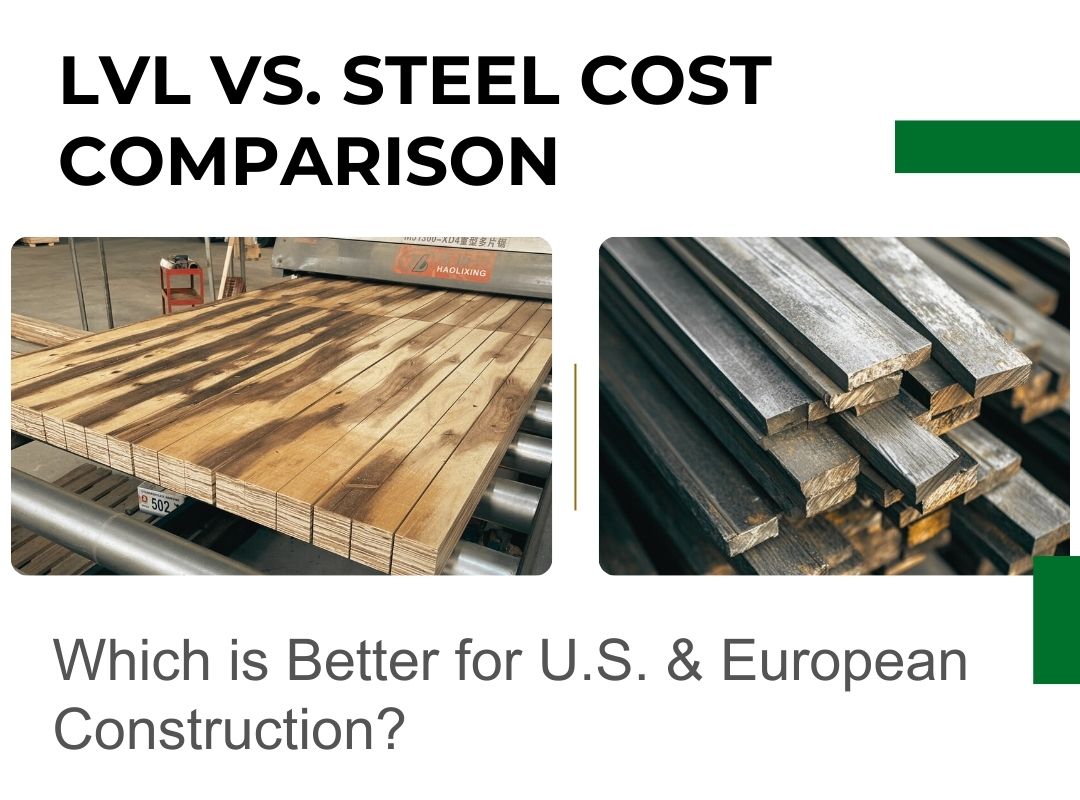-
-
-
Total payment:
-

LVL vs. Steel Cost Comparison: Which is Better for Construction?
Posted by Thanh Uyên at 07/05/2025
When planning a construction project, one of the biggest decisions is choosing the right structural material. Laminated Veneer Lumber (LVL) and steel are two popular options, but which one saves you more money without sacrificing strength?
This guide breaks down the real costs of LVL vs. steel in U.S. and European markets, helping homeowners, builders, and developers make the best choice.
1. What Are LVL and Steel?
LVL (Laminated Veneer Lumber)
LVL (Laminated Veneer Lumber) is made from thin wood veneer layers glued together under high pressure, creating a material that's stronger and more stable than traditional lumber. Its superior strength makes it ideal for structural applications like beams, headers, and floor joists. Unlike solid wood, LVL resists warping and maintains consistent performance over time. Builders choose LVL for its reliability in both residential and commercial construction projects.
(Laminated Veneer Lumber)
Steel
Structural steel, crafted from iron and carbon, delivers exceptional strength for beams, columns, and frames in commercial and industrial projects. While it conducts heat and cold, its unmatched load-bearing capacity makes it ideal for high-rise buildings, bridges, and industrial structures.
(Steel)
2. Cost Comparison: LVL vs. Steel
A. Material Costs (U.S. & Europe):
|
Factor |
LVL (per linear foot) |
Steel (per linear foot) |
|
U.S. Price |
$3–$8 |
$6–$15 |
|
Europe Price |
€4 – €10 |
€7 – €18 |
|
Installation |
Easier, lighter |
Requires heavy equipment |
✅ LVL Wins on Price – Generally 30-50% cheaper than steel for most residential projects.
B. Hidden Costs
1. Labor Costs
- LVL: Lightweight, cuts like wood → faster installation.
- Steel: Needs welding/cranes → higher labor fees.
2. Shipping & Handling
- LVL: Lighter → lower freight costs.
- Steel: Heavy → extra transport fees.
3. Thermal Efficiency
- LVL: Naturally insulates → reduces heating/cooling bills.
- Steel: Conducts heat/cold → may need extra insulation.
3. Where Does LVL Outperform Steel?
Residential Homes (U.S. & Europe)
- LVL is the go-to for floor joists, roof beams, and wall framing.
- Steel is overkill unless building multi-story or industrial structures.
Eco-Friendly Construction
- LVL: Made from sustainable wood → lower carbon footprint.
- Steel: Energy-intensive production → higher CO2 emissions.
Renovations & Extensions
- LVL fits easily into existing wood structures.
- Steel requires reinforcements, increasing costs.
4. When Should You Use Steel Instead?
High-Rise Buildings
- Steel’s strength is unbeatable for skyscrapers.
Fire Resistance Needed
- Steel doesn’t burn (but weakens under extreme heat).
- LVL can be fire-treated but isn’t naturally fireproof.
Long-Span Structures (Airports, Warehouses)
- Steel beams can span longer distances without support.
5. Final Verdict: Which is Cheaper?
|
Situation |
Best Material |
Why? |
|
House Framing |
LVL |
Cheaper, easier to install |
|
Commercial Buildings |
Steel |
Handles heavier loads |
|
DIY/Home Projects |
LVL |
No welding or cranes needed |
|
Extreme Weather Areas |
Steel |
More durable in hurricanes |
💡 Pro Tip:
- In the U.S., LVL is often the best value for homes.
- In Europe (where timber prices are higher), steel can sometimes compete.
6. Where to Buy LVL or Steel?
For U.S. Buyers:
- Retail Stores: Home Depot and Lowe’s carry LVL beams for small-scale projects.
- Bulk Orders: Many contractors import directly from certified manufacturers in Asia (like Vietnam, where high-quality LVL is produced at competitive prices).
For European Buyers:
- Local Suppliers: Bauhaus and other timber merchants stock LVL, but prices can be higher due to import tariffs.
- Global Sourcing: Savvy builders often partner with international plywood/LVL exporters (especially those with CARB P2 and FSC certifications) to reduce costs without compromising quality.
Pro Tip for Large Projects:
If you’re importing LVL for commercial use (e.g., apartment complexes or warehouses), work with suppliers who handle global logistics – from factory coordination to customs clearance. Some exporters even offer pre-cut sizes to minimize waste and speed up construction.
"At TT Plywood, we’ve helped U.S. and European builders streamline their LVL supply chains for 10+ years – from mill-to-site delivery to compliance paperwork. Need a quote tailored to your project’s specs? Contact us now to get free Sample:
📞Hotline/WhatsApp/Line/Kakao: +84 32 694 2288
📧Email: info@ttplywood.com
🌐Website: https://ttplywood.com/."*










